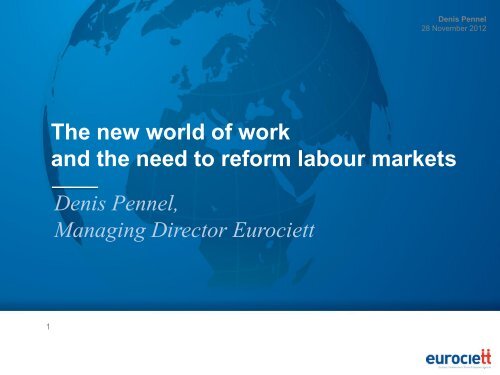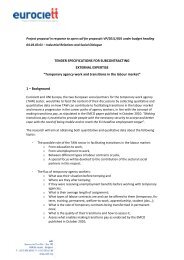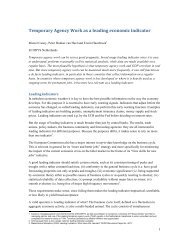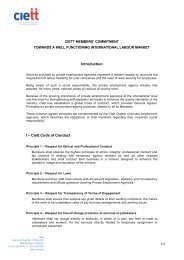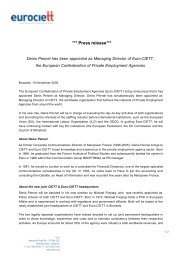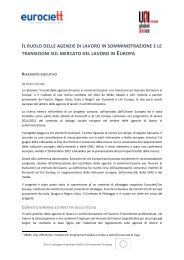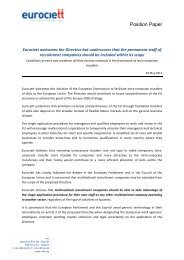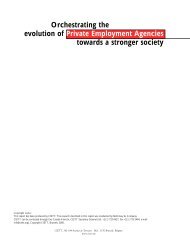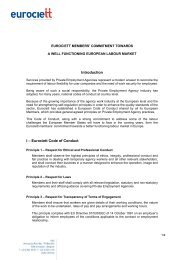here - Ciett
here - Ciett
here - Ciett
- No tags were found...
You also want an ePaper? Increase the reach of your titles
YUMPU automatically turns print PDFs into web optimized ePapers that Google loves.
Denis Pennel28 November 2012The new world of workand the need to reform labour marketsDenis Pennel,Managing Director Eurociett1
Key facts & figuresDenis Pennel28 November 2012• Eurociett represents 35,000 companies• 3 million agency workers are employed in Europeeach day• Members account for 90% of total industry salesrevenue• 7 of the largest multinational staffing companiesand 31 National Federations are members2• Eurociett members offer a full range of HR services
Eurociett National Federation membersDenis Pennel28 November 2012AustriaVZAGermanyBZAMacedoniaNFTWASloveniaZAZBelgiumFEDERGONGreeceENIDEANetherlandsABUSpainAGETT & AETTBulgariaBG StaffingHungarySZTMSZNorwayNHO ServiceSwedenALMEGACzech RepAPPSIrelandNRFPolandHR ForumSwitzerlandSwissStaffingDenmarkDansk ErhvervItalyASSOLAVOROPortugalAPESPETurkeyOIBDEstoniaEFPRALatviaLASARomaniaARAMTUKREC3FinlandHPLLithuaniaLIIARussiaAPEAFrancePRISMELuxembourgULEDISlovakiaAPAS
The world of work is undergoingfundamental structural shiftsDenis Pennel28 November 20125
Falling fertility:Ageing society towards 2050 (Europe)Denis Pennel28 November 20120-4 10-14 20-24 30-34 40-44 50-54 60-64 70-74 80+0-4 10-14 20-24 30-34 40-44 50-54 60-64 70-74 80+7Baseline 2008 Baseline 2050Baseline 2008 Baseline 2050Source: Eurostat
Rise in firm instability clearly visibleDenis Pennel28 November 2012Average expectancy lifeof a Standard & Poor’s 500 company1930s75 years2000s15 years8
An increasingly services-oriented economyDenis Pennel28 November 2012Employment sectoral split (%) at global level, from 1997 to 20079Source: ILO
TIC are part of young people vital lifeDenis Pennel28 November 201210
…creatingmassivechanges inthe labourmarketDenis Pennel28 November 201211
W<strong>here</strong> goes the new world of work ?Denis Pennel28 November 201212
InactiveUndeclaredSelf-employedVoluntaryInvoluntaryVoluntaryInvoluntaryVoluntaryInvoluntarySMEsMNCsDestandardisation: a multi-fragmented labour marketDenis Pennel28 November 2012UnemployedSalaried workersFTCPTCTAWPermanent contractsPrivate sectorPublicsectorLTST13
Policymakers have diversified labour contractualarrangements to support job creationDenis Pennel28 November 2012• Mini job • Civil contract• Fixed term• Flexitime• Student job• Training• Overtime• Welfare to work• Multiple-job holding • Telework• Open ended • Self-employed• Home working • Voluntary work• Trainee • Apprenticeshipagency work• Stand by duty• Seasonal contracts• Temporary14• Night shift• Casual work• Part-time• Job sharing• On-call work
…and a diversification of labour contractsNetherlandsDenis Pennel28 November 2012Permanentemployees5.108.00066%Self employed629.0008%Agency workers323.0004%Part-time contracts46%Fixed termcontracts1.667.00022%16Source: ABU 2009Of all working people,34% works in a flexible way(fixed-term, agency workers and selfemployed)
Mass-customisation requiresflexible work organisationDenis Pennel28 November 201217
…explaining companies’ need for labour flexibilityDenis Pennel28 November 2012The Flexible Firm18
What direction for business organizations ?Denis Pennel28 November 2012Large globalorganizations becomelargerWill substitute to Welfare Statesto offer protection to workersEmergence of small sizeorganisations to existonly to conduct a projectWorkers moving in and out of acompany’s doors on a just-intime,project-by-project basis19« In the early 1970s, 1 in 5 American workers was employedin a Fortune 500 company; in the early 1990s, ratio had droppedto 1 to 10 »
Work is no longer a place to go, but a task to doDenis Pennel28 November 201220
Denis Pennel28 November 2012How to adapt labour market regulationto the new world of work?21
The need to reform labour markets is beyong questionDenis Pennel28 November 2012Why reforms are needed?• To adapt the workplace to the new workforce• To drive economic growth and stimulate job creation• To increase productivity and innovation• To develop smart active labour market policiesEU Employment package: drive job creation and restore dynamics inthe labour market:• In many EU countries, structural reforms of labour markets are needed toimprove competitiveness• But need to avoid asymetric and unbalanced labour market reforms:22‣ promotion by EU of ‘Flexicurity model’
Regulation of labour contracts should be balancedas they react as communicating vesselsDenis Pennel28 November 2012OutsourcingSelfemploymentFixedtermTAWPart-TimeOn-callwork23
In EU, fixed-term contracts have over-developedcompared to TAWDenis Pennel28 November 2012EU averageof TAW1.6%EU average oftemporary contracts14%PolandSpainPortugalNetherlandsSloveniaSwedenFinlandFranceGermanyItalyGreeceHungaryIrelandAustriaCzech RepublicDenmarkBelgiumLuxembourgLatviaUnited KingdomSlovakiaBulgariaEstoniaLithuania24 RomaniaPecentage of employees with temporarycontracts (2010)Percentage of employees with agency workcontracts (2010)0,0% 5,0% 10,0% 15,0% 20,0% 25,0% 30,0%Note: Employees with temporary contracts are those who declare themselves as having a fixed term employment contract or a job which will terminate if certain objective criteria aremet, such as completion of an assignment or return of the employee who was temporarily replaced.Source: <strong>Ciett</strong>, Eurostat, BCG analysis
What would be the best approach to (re)regulatelabour markets in a balanced way?Denis Pennel28 November 2012FlexibilitySecurity25
Flexicurity should be used as a baseto reform labour marketsDenis Pennel28 November 2012The 4 pillars of FlexicurityFlexible & reliable labourcontractual arrangementsActive labour marketpolicies(that help people cope withrapid change)Social dialogueComprehensive life-longlearning strategies(to ensure continual adaptabilityand employability of workers)Modernising socialsecurity systems(that provide adequate incomesupport)26Warning : No one-size-fits-all approach!
The mix between flexibility and security has developeddifferently according to countries…Denis Pennel28 November 2012• Anglo-saxon system (market driven) of high flexibilityand low security gives high employment and fastadaptation to new conditions at the cost of wageinequality and insecurity• Social Dialogue systems (Nordics, Germany, Austria,Netherlands) of flexibility and high security also leads tohigh employment, mainly in state-supported jobs, at thecost of high taxation; a lot of state-provided security27• Southern European system (legislator-driven) of lowflexibility and moderate security through transfers leastfavorable to employment and adaptation to newstructural conditions
…Leading to different labour market performanceDenis Pennel28 November 201290807060504030201059,9 61,2 61,6Employment Rates of selected EU Countries(2011)64,1 64,869,173,6 73,8 75,2 76,3 77800Greece IT ES IRE PL FR UK FI AT DE NL SWLegislator-driven: weighting job security over flexibility28Market driven: weighting flexibility over securitySocial Dialogue based: strong focus on and tradition of Flexicurity
W<strong>here</strong> Flexicurity was implemented,labour markets tend to better functionDenis Pennel28 November 201229• EU Member States (mostly Social dialogue/Market driven) whichundertook early reforms are the ones that are now faring better thanthose that delayed taking active measures• Germany is a good example of a country that has benefited, alreadyduring the crisis, from having increased the flexibility of its labourmarket through reforms undertaken between 2003 and 2005. Currentlevels of joblessness in Germany - around 3 million – are at their lowestsince 1992• On the contrary, countries that continued to over-protect permanentcontracts risk adding to labour market segmentation:• Unduly high employment protection legislation of permanent contractscan stifle job creation by discouraging employers to recruit newworkers and can particularly affect young people• Southern European countries (Italy, Spain, Greece, Portugal) are laggingbehind in terms of reaching the right balance between flexibility andsecurity, leading to dual labour markets (Italy just started to reallyreform its labour market)
Level of unemployment is linkedto the strictness of employment protectionDenis Pennel28 November 201230Source: OECD 2009
Clear correlation between labour market performanceand employment rateDenis Pennel28 November 2012Employment rateEmployment rate 15-24Employment rate 55-6431Annual hours workedSource: BusinessEurope – European Reform Barometer 2012Labour participation rateUnemployment rate
Labour market effectiveness influences competitivenessDenis Pennel28 November 2012Labor Market Effectiveness Index score 21.5R 2 = 0.52Switzerland1.0NorwayAustraliaDenmarkNetherlands0.50.0SloveniaPortugalSouth KoreaCzech RepublicAustriaUKFinlandJapanUSAGermanySweden-0.5-1.0324.0GreeceSlovakiaHungaryItalyPolandSpain4.5IrelandChile5.0LuxembourgFranceBelgium5.5WEF GlobalCompetitiveness Indexscore 16.01. 2010-2011 score 2. BCG analysis based on a number of key labor market metrics; for detailed methodology see appendixSource: Eurostat; OECD; CIETT data; WEF Global Competitiveness Report 2010-2011
Conclusions: Recommendations to reform labour marketDenis Pennel28 November 20121. Allow for the balanced development of different forms of contractualarrangements to meet business and individual needs and removeunjustified restrictions2. Make permanent contracts employment-friendly to stimulate hiring3. Shift towards more active labour market policies in parallel withreforms of social security systems4. Open up for private agencies to provide employment services (andpromote cooperation with public employment services)5. Upgrade and update skills to meet demands of the labour market6. Cut red tape to encourage companies to grow33An efficient labour market is a key driverof competitiveness of a country:How to reach the right level of regulationto boost job creation and growth?
Denis Pennel28 November 2012Thanks!Questions?34More info at:www.eurociett.eu


